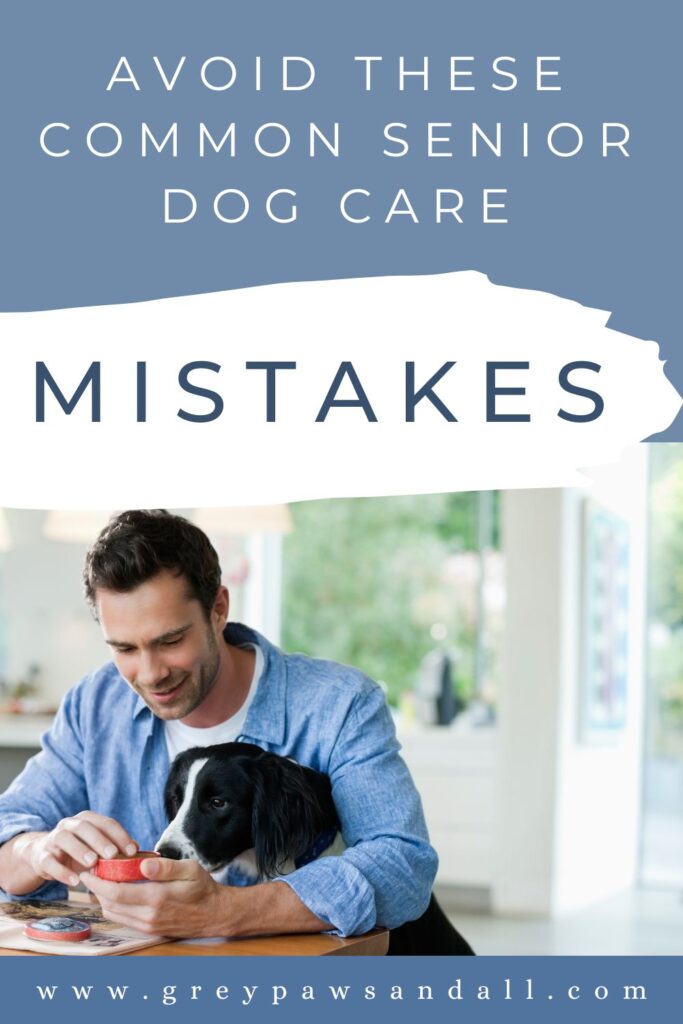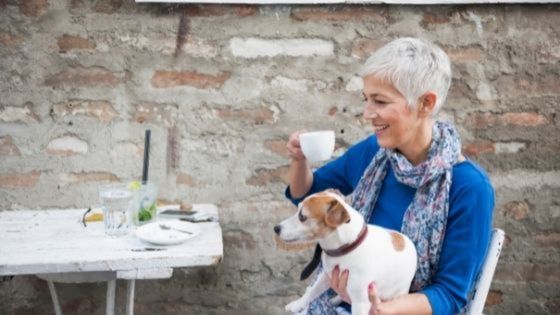If this is your first time sharing your life with a senior dog, you will definitely want to keep reading!
Some of the “mistakes” new senior dog parents often make include, not providing enough physical exercise, not realising the importance of mental stimulation, ignoring changes in behavior and accepting a “your dog is old” diagnosis from the vet.
I Don’t Like to Use the Word “Mistake”
I don’t care for the word “mistake” because it implies wrongdoing. We’re all on a learning curve, and we don’t know what we don’t know. I used it in the title as an easy way for readers to understand what this article is about.
**There are affiliate links in this post, which means if you buy something I may receive a small commission. This does not affect the price you pay, but will allow me to continue bringing you helpful content such as this**
15 Mistakes” New Senior Dog Parents Make and How to Avoid Them
1) Adopting a senior dog before you’re ready
With all the best intentions in the world, adopting a senior dog before you’re ready may not have the best outcome, and it’s the dog who will lose.
Not much makes me happier than hearing someone rescued an old dog. I love knowing another senior will be loved, and not die alone in a shelter. Having said that, caring for any dog is a big responsibility and huge commitment both in terms of time and other resources.
Here are things to consider:
Time: Do you have enough time in your schedule to care for a senior dog?
Patience: Many senior dogs are full of life, and as healthy as can be. Others have health issues and mobility problems that may slow them down, cause accidents in the house etc… Do you have the patience to deal with the latter?
Lifestyle: How busy is your life, and how willing are you to spend more time at home? Dogs of any age should not be left home alone all day, and dogs with health issues even less. Factor in how much clingier old dogs can get, and you may be giving up a lot of your free time. Are you willing to make those changes?
Living space: Will a dog fit in with your living space? Do you have other family members or pets who may be affected by adding a dog to your household? What about that expensive rug that may get peed on? Or your beautiful hardwood floors a senior dog may not be able to get traction on? Are you willing to cover them up?
Cost: Can you afford a senior dog? No matter what age a dog is, there are lots of costs involved: food, treats, toys, vaccinations, vet check ups, grooming, pet sitters, tests and medication
Type of dog: Do you have a particular breed or size in mind? One who recently entered “seniorhood” or as old as you can find? What about activity level? Plenty of older dogs have lots of energy, or do you prefer one that lives at a slower pace?
2) Not socializing the dog
I can’t emphasise enough the importance of socializing a dog, and that goes for seniors as well. We need to do our best to teach them how to live calmly and happily in our world. We don’t often know the background of a rescue dog, and spending time in a shelter can cause anxiety. Make sure you slowly introduce him/her to people, places and things so he has time to adapt to his new environment.
While I obviously believe what I just said is correct, I also believe it’s not the best advice for every new senior rescue. Depending on what that dog has been through, he may do better with just a small circle of those he comes to know and trust. Let’s say you rescued a blind senior dog who has spent a long time in a shelter. The world can seem like a scary place, so the best thing for that dog may be a very quiet life that makes her feel safe. Quiet doesn’t have to mean boring!
3) Lack of consistency
Before you brought your old dog home, you sat together as a family and talked about the rules and division of responsibility. He’s only been home a few days and you’re already seeing a lack of consistency.
For example, if your dog is not allowed to beg for food at the table but a member of your household is slipping him some, how can your dog learn begging is not acceptable? In addition to the behavior implications, there are health implications to not knowing what or how much food your dog is eating.
An older dog’s stomach is often quite sensitive, so eating a variety of foods can cause diarrhea. This can lead to dehydration quite quickly in an older dog, which left untreated can be deadly.
Feeding a dog of any age high fat foods can lead to pancreatitis, another potentially deadly condition if not treated quickly.

4) Not having a schedule
Believe it or not, it’s anxiety causing for a dog when they have no idea what’s happening when. I’m not referring to the family outings you take or the extra hike in the woods, but the basics such as meal and walk times.
For example, one day your dog eats at 7:00, the next at 8:30 and the next at 10:15, then it’s at 6:20. He doesn’t have to eat exactly the same time every morning, but it should be within about 30 minutes or so. This is particularly important for a dog who isn’t eating as well as he should, or medication schedules that need to be followed.
The same can be said for walks, and knowing approximately when he’ll be going out for walks and pee breaks.
5) Not seeing the vet enough
Twice yearly vet visits are recommended for senior dogs, even if they seem to be in great health. A problem caught early has a much better chance of being treated, or at least managed successfully.
6) Accepting a diagnosis of “your dog is old” without question
♦ Many changes witnessed by senior dog owners are attributed to a natural part of getting older. For example, it is assumed vision loss is part of aging so nothing is done about it. Not every old dog will go blind, and in some cases, eyesight can be saved. If you do have a dog with vision issues, I recommend you read the article below for helpful tips. I shared my life with 2 blind dogs, so I know you’ll benefit from this post.
“A Guide to Caring for Your Blind Dog”
♦ Some senior dog parents expect an older dog to spend most of the day in bed, when in fact they’re in pain from arthritis. They don’t realise a lot can be done to get them out of pain and enjoying walks. Don’t skip reading the article below!
“5 Effective Ways to Reduce Pain in Dogs with Arthritis”
♦ It’s also unfortunate some vets don’t see much value in old dogs, and are very quick to dismiss concerns by saying your dog is old. If you have a vet that doesn’t take you seriously, or doesn’t seem to have the best attitude about our older companions, find someone better.
7) Lack of exercise and mental stimulation
Physical exercise: Old dogs need exercise just like young ones, the difference may be the type and frequency. Is he up for a hike, or are 4 or 5 short walks a day better? How about swimming? A home-made obstacle course? Play dates with other doggy friends of similar activity level?
Winter temperatures, harsh conditions and even extreme heat can limit the amount of walks your dog gets. For those days when he/she can’t get out for more than a quick pee or poop, here are some great ways to ensure they still get some much needed exercise ⇒ “17 Fun Ways to Exercise Your Senior Dog in Winter”
Mental stimulation: Mental stimulation may not only help prevent/delay dementia, it also helps burn off excess energy and staves off boredom. This is important for dogs of all ages, and definitely for dogs with reduced mobility.
- Puzzle toys
- Play hide and seek with your dog
- Stuff a snuffle mat or snuffle ball with treats or a meal
- Instead of using a bowl, scatter some of your dog’s food on the floor and let him find it. Probably best done with dry food.
- Fill a Kong with food he has to find a way to get out. Freezing it slightly makes it more challenging
8) Having unrealistic expectations
It’s possible your new old dog will come bounding in, jump on the couch, and settle in like he’s lived there all his life…but don’t be disappointed if that doesn’t happen.
Your dog has just been uprooted from where he was living, and brought into what he may see as a strange and scary environment. He’s spending most of his time hiding under the bed or in a closet, and has already peed on your carpet.
Having volunteered in shelters, I’ve seen first hand how unrealistic expectations led to these poor dogs being dumped pretty quickly.
Give him time to adapt, and if you need help, contact a certified dog trainer or Senior Dog Care Consultant like myself, that specializes in working with older dogs. Click this link to book a FREE 20 minute consultation with me.
9) Neglecting dental health
Many people seem to think “doggie breath” is a normal thing. To a certain extent it is, but it can also be a sign of some degree of dental disease. It may be as simple as a bit of tartar buildup, or full on dental disease. Untreated it will leave your dog in pain, and in extreme cases can cause kidney failure and heart disease. If your dog’s teeth have not been checked by your vet in a while, make sure you get that taken care of sooner rather than later.
There’s a lot you can do to take care of your dog’s dental health at home – regular brushing, water additives, Plaque Off sprinkled on food and dental chews.
For more information, visit my Resource Page and scroll to the dental care section
I know the fear of anesthesia puts a lot of senior dog parents off of agreeing to dental surgery, even when recommended. I also understand that fear, having had a few senior dogs undergo surgery, so I wrote an article about it here ⇓
“Is Anesthesia Safe for Senior Dogs?“
10) Ignoring changes in behavior
Whether it’s because we don’t want to seem paranoid by calling the vet all the time, or believe changes are normal as dogs get older, ignoring them is something we should never do. It’s often a sign something isn’t “right” and the earlier we catch it the better the chances of treating, or at least managing it.
If you feel something is “off” but can’t seem to put your finger on exactly what’s wrong, that’s okay. Make a vet appointment and in the meantime, make as many notes as you can about:
- When you started thinking something’s wrong
- Does it happen at certain times of the day or night
- Is it something you notice every day or just sometimes
- Describe as best as you can what you’ve been seeing
Bringing these notes to your appointment will help your vet with a diagnosis, and make the limited time you have more productive.

11) Allowing another dog to bother your senior dog
Whether you already have a dog and recently welcomed an older one, or your resident dog is a senior and you got a younger pup, have them greet each other on a leash and supervise them when they’re together…at least at the beginning.
You want to give the dogs time to get to know each other, and to ensure your old dog is not constantly being harassed by his or her overeager counterpart. It’s very possible they’ll have a great time playing together, and they’ll be good company for each other. You just want to make sure your old dog is left alone when he wants, and doesn’t get injured, especially if he’s already dealing with mobility issues.
12) Not preparing for emergencies
No pet parent likes to think about the unexpected, but sometimes emergencies happen. The best thing anyone can do is be prepared.
Microphip your dog: One way to prepare for emergencies is to get your dog microchipped. It’s a tiny device the size of a grain of rice, inserted between your dog’s shoulder blades. It contains your contact information, which should always be kept up to date. A lost dog would be taken to the vet, local shelter or animal control, scanned, and then a call made to the owner.
Even if your dog is always on a leash or spends all his time in a fenced in yard (which I hope isn’t the case because he needs walks!), it’s still the best safety precaution you can take.
Emergency kit: Another way to prepare is by keeping an emergency kit in your home, car, caravan. Include anything your dog needs should you have to evacuate your home. The kit might include dog food, a dog bed, a water bowl, some toys, a blanket or towel, an extra leash, poop bags, medications, and information about local emergency response centers.
13) Failing to budget for expenses
Sharing your life with a dog of any age costs money, sometimes a lot of money. Make sure your budget includes all of the routine costs associated such as food, supplies, and veterinary care. Don’t forget extras such as medication, pet sitter, dog walker, treatments such as acupuncture, laser therapy and the like.
Next, allow for the unexpected. Are you ready in case of an emergency or unexpected injury/illness? Emergency vets cost a lot more than your regular vet, but that’s how they can be open at 3 a.m. What happens if you adopt a senior dog with health issues? Can you cover the cost of an unexpected illness your vet may find?
I’m including 3 articles about saving money you’ll find helpful.
“20 Ways to Save Money on Vet Bills”
“15 Money Saving Tips for Senior Dog Parents”
“Where to Get Help Paying Your Vet Bills”
14) Not recognizing fear or anxiety
Many dog parents refer to their dogs as being stubborn. They’ll say their dog won’t walk nicely, isn’t interested in greeting other dogs, ignores them, won’t sit still in the car etc… If you’ve rescued a senior dog, it’s likely you don’t know much, if anything about their background. For example, he may have been attacked by a dog so now avoids them while on a walk.
We’re talking about old dogs, so please consider he or she may be feeling afraid or anxious, and the worst thing you can do is to keep putting him in that same situation over and over. It will make things worse, and could end up with him biting another dog or person.
This anxiety could be the result of vision and/or hearing problems, mobility issues, dental pain to name just a few.
I suggest you book an appointment to have your dog checked by the vet as soon as possible. In the meantime, make notes of the behaviors you’ve been noticing, when they started, what else was going on at the time etc… Bring this information with you, because it will help your vet with a diagnosis.
You may also want to consult a trainer who specializes in working with senior dogs. They can offer tips on how to help your dog get over the anxiety or offer suggestions on managing it. This is my specialty so I’m very happy to help. My contact details are below.

15) Underestimating how much time and energy having a senior dog takes
Whether you’re a first time senior dog parent, have lots of experience or fall somewhere in between, it can take a lot of time and energy to care for an old dog.
Plenty of senior dogs are in great shape – healthy and energetic enough to put their younger counterparts to shame. Plenty are also dealing with health issues and challenges that can make them needy. As dogs get older, expect many of them to become a lot clingier, and experience some degree of separation anxiety.
The reality is, every dog no matter how young or old they are, needs your time and can at times, sap your energy. Just make sure you’re prepared, whether that means adjusting your schedule, recruiting family or friends when needed, hiring a dog sitter or arranging doggy day care.
Conclusion
I hope you’ve found the information in this post helpful. As a first time senior dog parent, what tips and advice would you offer someone just starting out on this amazing adventure? Sharing helps others so please leave them in the comments section below.
I am a Senior Dog Care Consultant, helping senior dog parents struggling with anticipatory grief, quality of life and health & wellness issues. I offer practical tips, advice and one on one support. I am also a Certified Pet Loss Bereavement Specialist, helping you navigate through your pet loss journey.
Click this link to book a FREE 20 minute discovery call, visit my services page to find out more or email hindy@greypawsandall.com if you have any questions.
I’ve been rescuing and caring for senior dogs since 2009. From vision and hearing loss to obesity, dementia, kidney disease, liver issues, cardiac problems, Cushing’s, mobility challenges and more, you could say I’ve dealt with and learned a lot! In addition to my hands on experience, I’ve taken many courses and earned several qualifications to keep learning how to help senior dogs and they include: Senior Dog Enrichment, Understanding Canine Anxiety, Care of the Senior Pet and I’m a Certified Pet Loss Specialist.

